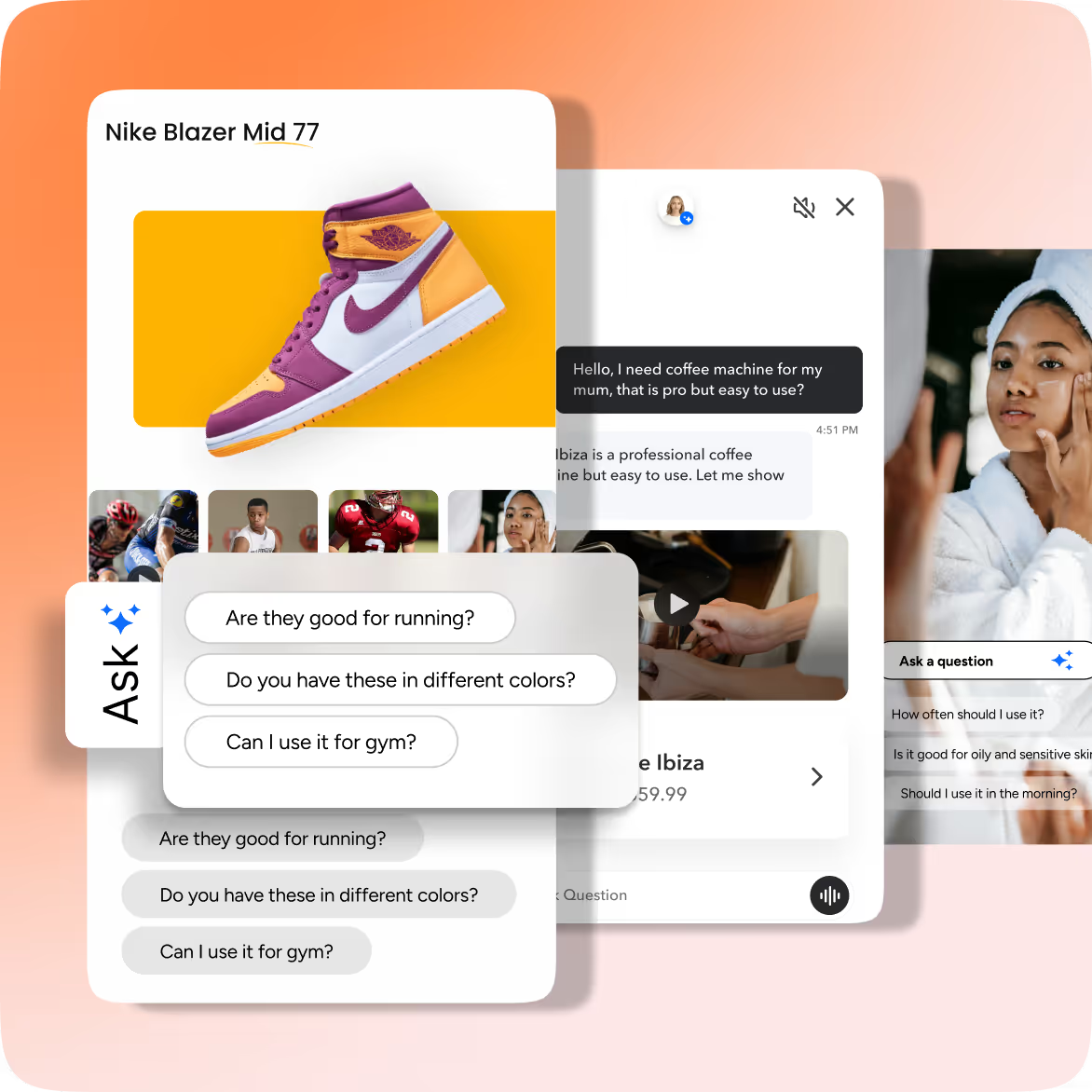AI is reshaping the way businesses interact with customers, driving personalization, efficiency, and innovation. Here are the top ways AI is transforming the customer experience for the better.
1. Personalized Interactions Through AI-Driven Insights
AI allows businesses to create personalized customer experiences by analyzing user behavior, preferences and needs in real time.
Customer Data Analysis
AI tools collect and analyze vast amounts of data to understand customer preferences. By examining browsing history, purchase patterns, and interaction data, AI can identify what customers like and dislike. This automatically helps increase the average order value, and the deep understanding helps businesses tailor their offerings to meet individual needs.
Tailored Recommendations
AI-driven platforms offer personalized product suggestions based on customer browsing history and behavior. For example, if a customer frequently browses for running shoes, the AI system will recommend the latest models and deals on running shoes, enhancing the shopping experience and increasing the likelihood of a purchase.
2. AI-Powered Chatbots and Virtual Assistants
Chatbots are no longer just FAQ machines—they are now sophisticated tools powered by AI that improve customer service 24/7, resulting in transforming business.
Instant Responses
AI chatbots handle common queries immediately, enhancing response time. Customers no longer have to wait for a human agent to become available. Instead, they get instant answers to their questions, improving satisfaction and efficiency.
Natural Language Processing (NLP)
Advanced NLP capabilities help chatbots understand complex customer questions and provide more accurate responses. This means that chatbots can handle a wider range of inquiries, from simple ones like "What are your store hours?" to more complex ones like "Can you help me troubleshoot this issue with my product?"
Real-Time Solutions
AI chatbots can answer queries and solve issues without human intervention, cutting down on long waiting periods. For instance, if a customer needs to reset a password or track an order, the chatbot can guide them through the process step-by-step, ensuring a smooth and quick resolution along with enhancing the likelihood of repeat purchases.
3. Predictive Analytics for Anticipating Customer Needs
AI can predict future customer needs by analyzing patterns in past behavior, enabling proactive service and product offerings.
Personalized Recommendations
AI provides businesses with insights that help anticipate what a customer might need next. By examining past purchases, browsing history, and interaction data, AI can suggest products or services that align with a customer's preferences.
Customer Retention
Using AI to predict potential churn, businesses can take action to keep customers engaged. AI identifies patterns that indicate a customer might leave, such as reduced engagement or negative feedback. With this information, businesses can implement targeted retention strategies, like personalized offers or proactive customer service, to address issues before the customer decides to leave. This helps revolutionize the retail realm.
4. Enhancing Customer Support with AI Automation
AI-driven automation tools streamline and improve the efficiency of customer service operations.
Automated Ticketing Systems
AI helps prioritize customer issues and allocate them to the right support agent faster. When a customer submits a query, AI analyzes the content to determine the urgency and complexity of the issue. It then assigns the ticket to the most suitable agent, ensuring that high-priority issues receive immediate attention and are resolved quickly.
Intelligent Routing
AI ensures that customer queries are sent to the most relevant department or agent based on issue type. For example, a technical issue with a product would be routed to a technical support team, while a billing question would go to the finance department. This targeted approach reduces resolution times and improves overall customer satisfaction by reshaping ecommerce.
5. AI for Sentiment Analysis and Customer Feedback
Using AI, businesses can analyze customer sentiment through reviews, social media, and feedback forms to understand how customers feel about products and services. This approach is revolutionizing the shopping experiences globally.
Sentiment Analysis Tools
AI tools can monitor emotions and opinions in customer feedback to help businesses improve their offerings. These tools scan text for keywords, phrases, and emotional indicators, providing insights into customer satisfaction levels. For example, if a customer frequently uses words like "disappointed" or "frustrated," the AI flags this feedback for further review, allowing businesses to address issues promptly.
Real-time Feedback Collection
AI automatically gathers and analyzes feedback, allowing businesses to respond quickly to negative reviews or complaints. This real-time capability ensures that customer concerns are addressed before they escalate. For instance, an effective social commerce strategy involves that if a customer leaves a negative review on social media, the AI system alerts the customer service team immediately, enabling them to reach out and resolve the issue swiftly.
Loyalty Programs
AI benefits retail and other businesses by helping create personalized loyalty programs based on customer data, encouraging repeat business. By analyzing purchase history and engagement levels, AI identifies customers who are likely to respond positively to loyalty incentives. Businesses can then tailor rewards and offers to these customers, enhancing their overall experience and fostering long-term loyalty.
6. AI for Multichannel Customer Experiences
AI helps integrate customer experience across various platforms, ensuring consistent engagement whether customers are interacting through email, chat, or social media.
Omnichannel Support
AI connects multiple channels, creating seamless interactions across platforms. This means that whether a customer starts a conversation on social media, continues it via email, or finishes it on live chat, the AI system follows an omnichannel strategy, a unified record of the interaction. This continuity ensures that customers do not have to repeat themselves, providing a smoother and more efficient experience.
Enhanced Consistency
AI ensures that customer data and interactions are aligned across all touchpoints, reducing friction. For example, if a customer inquires about a product via chat and later calls customer service, the AI system provides the agent with the complete interaction history. This alignment helps agents provide more informed and personalized support, enhancing customer satisfaction.
Integrated Analytics
AI-powered analytics track customer interactions across all channels, providing businesses with a comprehensive view of customer behavior. This data helps identify trends and areas for improvement, allowing businesses to refine their strategies and deliver a more cohesive customer experience.
7. AI-Enhanced Voice Assistants and Speech Recognition
Voice assistants like Alexa and Siri, powered by AI, are transforming the way customers engage with brands through hands-free interaction.
Voice Commands
AI-powered voice assistants allow customers to make purchases, find product information, and access customer support easily. You can ask your voice assistant to reorder your favorite products, check the status of an order, or even get detailed information about a product's features and benefits. This hands-free convenience makes shopping and customer service more accessible and efficient.
Speech Recognition
AI ensures higher accuracy in recognizing and responding to voice commands, improving user experience and elevating luxury retail. Advanced speech recognition technology can understand various accents, dialects, and even background noise, providing a seamless and intuitive interaction. This means fewer misunderstandings and more accurate responses, enhancing overall satisfaction.
8. AI-Driven Personalization in Marketing Campaigns
AI allows businesses to create targeted marketing campaigns that resonate with specific customer segments.
Automated Content Generation
AI can create personalized email and ad content tailored to customer interests. Imagine receiving an email that feels like it was written just for you, featuring products you’ve shown interest in and special offers that match your buying habits. AI analyzes your past interactions and preferences to craft messages that are more likely to catch your attention and drive engagement.
Customer Segmentation
AI identifies key customer groups, enabling more effective campaign targeting. By analyzing data such as purchase history, browsing behavior, and demographic information, AI can segment customers into distinct groups. This allows businesses to tailor their marketing efforts to each segment, ensuring that the right message reaches the right audience.For example, a fitness brand might target one campaign at young professionals interested in high-intensity workouts and another at older adults looking for low-impact exercise options.AI-driven personalization in marketing campaigns helps businesses connect with their customers on a deeper level, making their marketing efforts more relevant and effective.
9. AI-Powered Self-Service Tools for Customer Empowerment
AI enables businesses to develop self-service tools that let customers solve issues independently, reducing the need for human intervention.
Knowledge Bases
When you type a query, AI quickly sifts through vast amounts of information to present the most relevant answers. This means you can find solutions to common problems without waiting for a support agent. Whether it's troubleshooting a device or understanding a service feature, AI-driven knowledge bases provide instant, accurate responses.
Self-Service Portals
Customers can resolve issues like order tracking or troubleshooting with AI-driven guides. These portals offer step-by-step instructions tailored to your specific issue. For instance, if you're tracking an order, the AI system provides real-time updates and expected delivery times. This self-sufficiency enhances your experience by giving you control and reducing wait times.
10. AI in Fraud Detection and Security for Better CX
AI helps businesses secure customer transactions by detecting and preventing fraudulent activity in real time.
Real-Time Monitoring
As you make transactions, AI continuously monitors for unusual patterns, such as multiple failed login attempts or large, unexpected purchases. This vigilance ensures that any potential threats are identified and addressed immediately, keeping your data safe.
Fraud Prevention
When the system detects an anomaly, it automatically alerts the security team and may even take preventive actions, such as temporarily freezing the account or requiring additional verification. This proactive approach minimizes the risk of fraud and gives you peace of mind, knowing that your transactions are secure. Stay ahead of the curve with the latest AI trends in fraud detection and security.AI's role in fraud detection and security not only protects your data but also enhances your overall experience by ensuring that your interactions with businesses remain safe and trustworthy.
Wrapping up
AI is reshaping customer experience by driving personalization, efficiency, and innovation. Adopting AI enhances interactions, streamlines support, and anticipates customer needs, making your business more responsive and customer-centric.Put your commerce in motion. Find out how Firework can power your business forward. Visit Firework to request a demo and explore how our interactive and shoppable video solutions can transform your customer experience.
Unlock Exclusive Insights
By submitting this form, you agree to Firework's privacy policy and consent to receive personalized marketing communications. You can unsubscribe at any time.





























.jpg)
